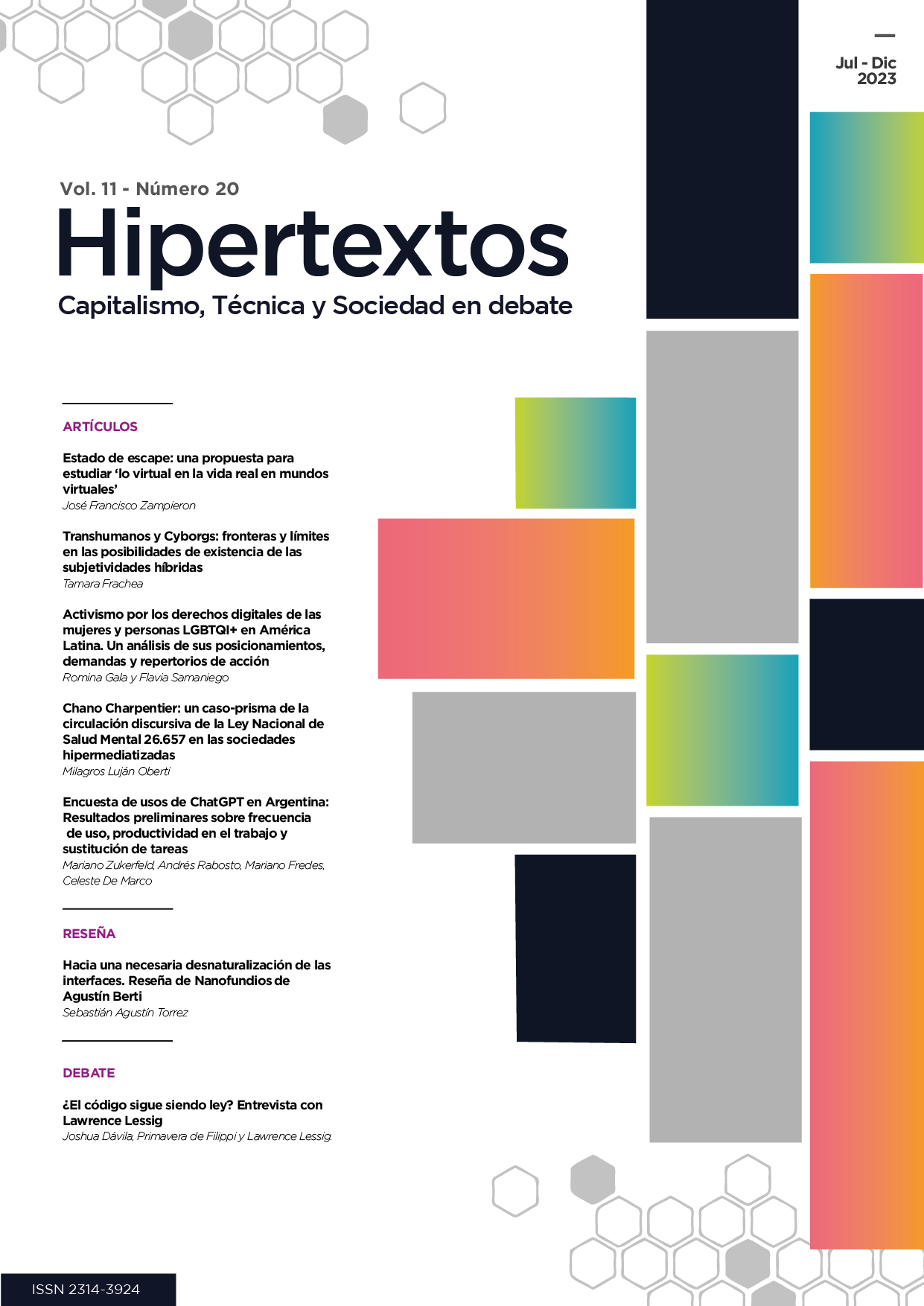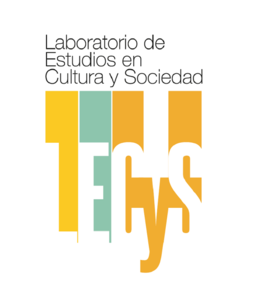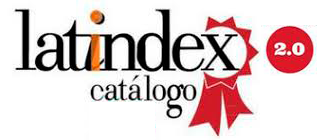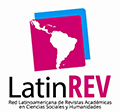Escape state: a proposal to study "the virtual in real life in virtual worlds"
DOI:
https://doi.org/10.24215/23143924e071Keywords:
digital ethnography, phenomenology, immersion, methodology, virtual worldsAbstract
This paper intends to discuss a methodological proposal based on phenomenology and its capacity for ethnographic explanation of what I am going to describe an "escape state": a conceptual framework of analysis based on the epistemological perspective of the liminoid as perception and experience. The bibliographic articulation on the current state of digital ethnography and the use of classic anthropology texts will have great weight going through the article, given its theoretical-methodological premise. In this sense, by developing an ethnographic reflection of my experiences in Roblox, SecondLife and, more especially, VRChat, I am going to elaborate the idea of an "escape state" as the phenomenological step from “back and forth” of the perception of materials and materiality, to finally, at the end of the article, evaluate it as an analytical framework using examples of ethnographic experiences I had in VRChat, in an effort to indicate a path towards understanding the infrastructural, contextual and content realities that surround personal and communal relationships in virtual/digital worlds. Thus, I will work the qualitative and dense description of the ethnographic experiences during the exploratory field developed from april 2021 to february 2022 using storytelling elements such as explanation and remembrance of events, contexts and conversations that I had with interlocutors, based on my field notes and field diary, in addition to recorded photographic material (printscreens).
Downloads
References
Álvarez Corona, E. (2021). Cuerpos fractales: fenomenología de la encarnación digital en la plataforma de realidad virtual VRChat. Universidad de San Andrés.
Ashoff, R. (2022). Welcome to VRChat: An ethnographic study on embodiment and immersion in virtual reality. Stockholm University.
Bauman, Z. (2014). Modernidade líquida. Zahar.
BBC (7 de enero de 2021). Game maker Roblox's value rockets seven-fold during pandemic. BBC. https://www.bbc.com/news/business-55570009
Boellstorff, T. (2008). Coming of Age in Second Life. An Anthropologist Explores Second Life. Princeton University Press.
Boellstorff, T., Nardi. B., Pearce, C., Taylor, T.L. y George, E. M. (Eds.). (2012). Ethnography and virtual worlds a handbook of method. Princeton University Press.
Boellstorff, T. y Soderman, B. (2019). Transplatform: culture, context, and the intellivision/atari VCS rivalry. Games and Culture, 14(6), 680-703. https://doi.org/10.1177/1555412017721839
Boas, F. (1989). A Franz Boas reader: the shaping of American anthropology, 1883-1911. University of Chicago Press.
Burrel, J. (2017). The Fieldsite as a Network: A Strategy for Locating Ethnographic Research. En L. Hjorth, H.A. Horst, A. Galloway y G. Bell (Eds.), The Routledge Companion to Digital Ethnography (pp. 51-69). Routledge.
Curry, D. (18 de julio de 2022). Roblox Revenue and Usage Statistics. Businessofapps. https://www.businessofapps.com/data/roblox-statistics/
D'Aloia, A. (2009). Adamant Bodies. The Avatar-Body and the Problem of Autoempathy, 5, 51-58.
Danowski, D. y Viveiros de Castro, E. (2019). ¿Hay mundo por venir? Ensayo sobre los miedos y los fines. Caja Negra.
Dean, B. (2022). Roblox User and Growth Stats 2022. Backlinko. https://backlinko.com/roblox-users
Deflem, M. (1991). Ritual, Anti-Structure, and Religion: A Discussion of Victor Turner’s Processual Symbolic Analysis. Journal for the Scientific Study of Religion, 30(1). https://doi.org/10.2307/1387146
Durkheim, E. (1991). Las reglas del método sociológico. Premiá.
Earing, W. (2021). Le potentiel de l’avatar: choix opérés de l’utilisation d’un avatar par des apprenants de langue dans l’environnement virtuel immersif VRChat [Disertacíon doctoral]. Université de Lorraine.
Geertz, C. (2008). A Interpretação das Culturas. LTC.
Goffman, E. (1959). The Presentation of Self in Everyday Life. Doubleday Anchor Books.
Horst, H. A. y Miller, D. (2012). Digital Anthropology. Berg.
Husserl, E. (1962). Ideas relativas a una fenomenología pura y una filosofía fenomenológica. FCE.
Husserl, E. (1982). La idea de la fenomenología. FCE.
Ingold, T. (2013). Los Materiales contra la materialidad. Papeles de Trabajo, 7(11), 19-39.
Kim, A. S. (2021). Virtual Worldmaking: A Phantasmal Media Approach to VRChat [Disertacíon doctoral]. Massachusetts Institute of Technology.
Kozinets, R. V. (2015). Netnography redefined. Sage Publications.
Latour, B. (2008). Reensamblar lo social: una introducción a la teoría del actor-red. Manantial.
Lévi-Strauss, C. (1987). Antropología estructural. Eudeba.
Lévy, P. (1999). Cibercultura. Editora 34.
Malinowski, B. (1986). Los Argonautas del Pacífico Occidental. Planeta-Agostini.
Mauss, M. (2009). Ensayo sobre el Don. Forma y Función del Intercambio en Sociedades Arcaicas. Katz.
Merleau-Ponty, M. (1994). Fenomenología de la percepción. Planeta-Agostini.
Mezzadra, S. y Neilson, B. (2017). La frontera como método. Traficantes de sueños.
Miller, D. y Sinanan, J. (2017). Visualizing Facebook. A comparative perspective. UCL Press.
Miranda, F. M. (2009). Fandom: um novo sistema literário digital. Intersecções: ciência e tecnologia, literatura e arte. Edufpe.
Montemorano, C. (2020). Body Language: Avatars, Identity Formation, and Communicative Interaction in VRChat. Student Research Submissions, 361. https://scholar.umw.edu/student_research/361
Nagamachi, K., Kato, Y., Sugimoto, M., Inami, M. y Kitazaki, M. (2020). Pseudo physical contact and Communication in VRChat: A study with Survey method in Japanese users. https://diglib.eg.org/handle/10.2312/egve20201275
Nardi, B. (2010). My Life as a Night Elf Priest An Anthropological Account of World of Warcraft. University of Michigan Press.
Oliveira, R. (1996). O trabalho do antropólogo. Revista de Antropologia, 39(1), 13-47.
Pearce, C. y Artemisia (2009). Communities of play: emergent cultures in multiplayer games and virtual worlds. MIT Press.
Pearson, R. (2010). Fandom in the digital era. Popular communication, 8(1), 84-95.
Pedersen, M. E. (2021). Exploring post-irony through narratives of love and suffering in VRChat. Aarhus University.
Peirano, M. (2014). Etnografia não é método. Horizontes Antropológicos 20(42), 377-391. https://doi.org/10.1590/s0104-71832014000200015
Qingqing X. y Kije, K. (2022). Research of the Influences of Doujin Culture in Game Operation. The International Journal of Advanced Smart Convergence, 11(3), 85-92.
Rospigliosi, P. (2022). Metaverse or Simulacra? Roblox, Minecraft, Meta and the turn to virtual reality for education, socialisation and work. Interactive Learning Environments, 30(1), 1-3, https://doi.org/10.1080/10494820.2022.2022899
Rzeszewski, M. y Evans, L. (2020). Virtual place during quarantine–a curious case of VRChat. Rozwój Regionalny i Polityka Regionalna, (51), 57-75.
Shaw, D. B. (2008). Technoculture. Berg.
Steamcharts. (2022). VRChat. https://steamcharts.com/app/438100
Taylor, T. L. (2006). Play Between Worlds: Exploring Online Game Culture. MIT Press.
Torres, M. A. R. (2008). Ciberetnografía: comunidad y territorio en el entorno virtual. En E. Ardévol, A. Estalella, y D. Domínguez Figaredo (Coords.), La Mediación Tecnológica en la Práctica Etnográfica (pp. 9-30). ANKULEGI.
TouhouVR. (22 de noviembre de 2021). VRChat Groups Profile. https://vrcprofile.com/groups/27
Touhou Wiki. (s.f.). Danmaku. Recuperado el 20 de noviembre de 2023 de https://es.touhouwiki.net/wiki/Danmaku
Touhou Wiki. (s.f.). Touhou Project. Recuperado el 16 de noviembre de 2023 de https://es.touhouwiki.net/wiki/Touhou_Project
Touhou Wiki. (s.f.). FumoFumo. Recuperado el 16 de noviembre de 2023 de https://en.touhouwiki.net/wiki/FumoFumo
Turner, V. (1974). Liminal to liminoid, in play, flow, and ritual. Rice University Studies, 60(3), 53-92.
Turner, V. (1969). The Ritual Process: Structure and Anti-Structure. Aldline Publishing.
Turner, V. (1990). La selva de los símbolos. Siglo XXI.
Turner, V. y Bruner, E. M. (1986). The Anthropology of Experience. University of Illinois Press.
Van Gennep, A. (2008). Los ritos de paso. Alianza.
Weber, M. (2012). La ética protestante y el espíritu del capitalismo. FCE.
Zapata, L. y Genovesi, M. (2013). Jeanne Favret- Saada: “ser afectado” como medio de conocimiento en el trabajo de campo antropológico. Avá. Revista de Antropología, (23), 49-67.
Downloads
Published
How to Cite
Issue
Section
License

This work is licensed under a Creative Commons Attribution-NonCommercial-NoDerivatives 4.0 International License.
























